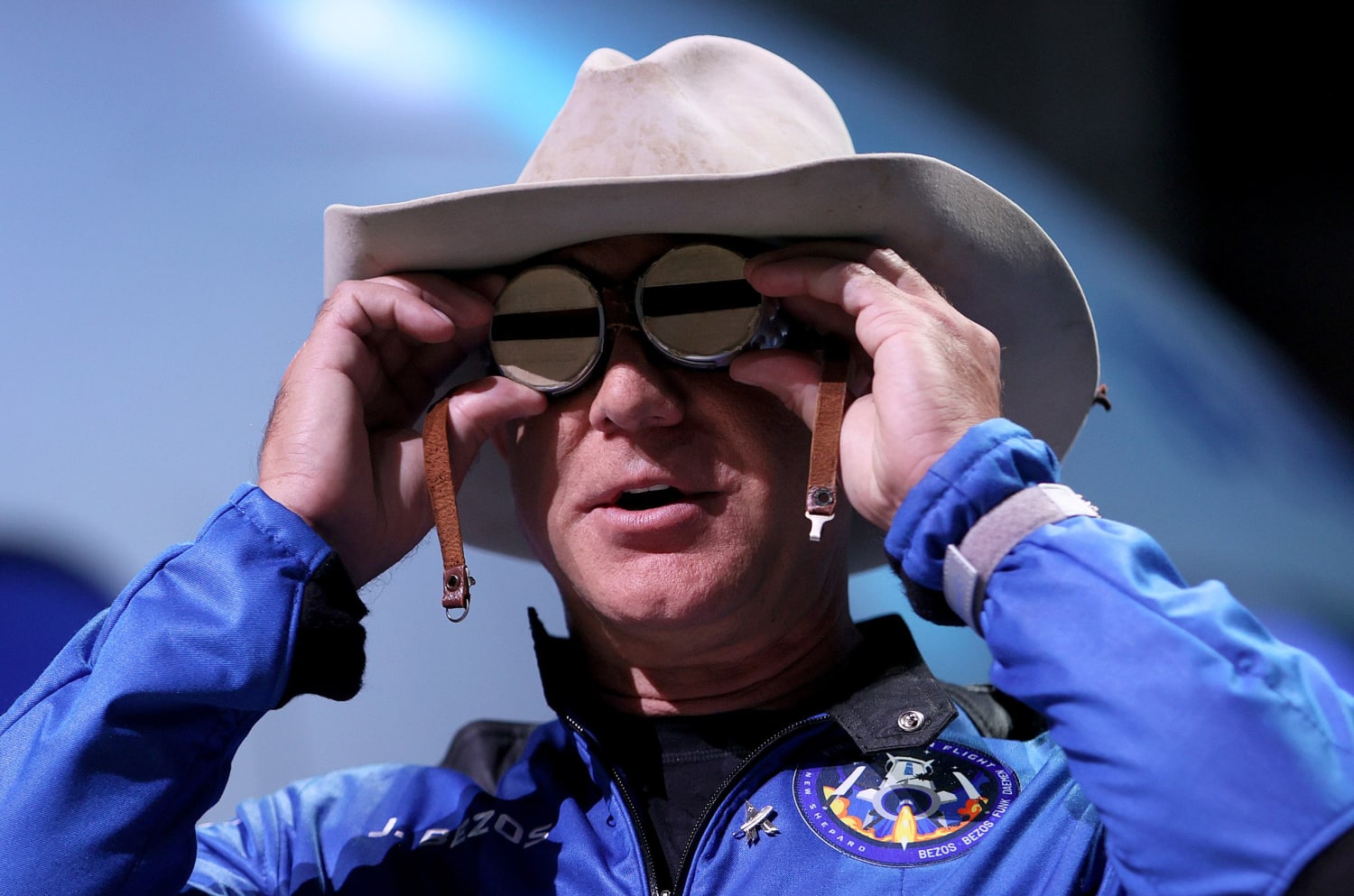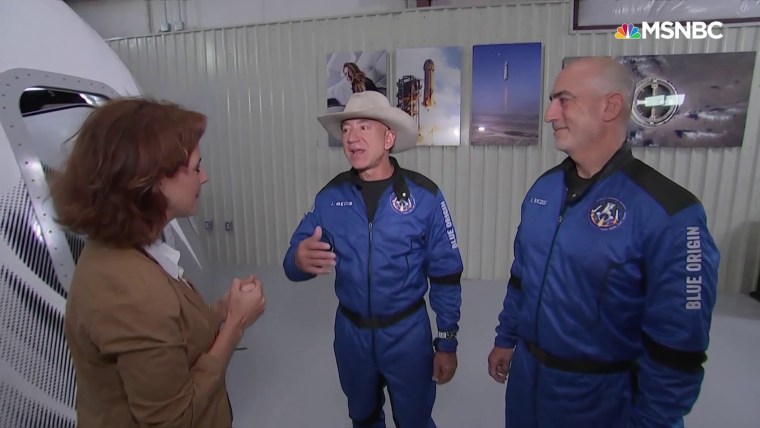On Tuesday morning, former Amazon CEO Jeff Bezos boarded Blue Origin’s New Shepard spacecraft in West Texas with his brother, Mark, Mercury 13 astronaut candidate Wally Funk and an 18-year-old Dutch student for the first unpiloted suborbital flight with an all-civilian crew. The Blue Origin accomplishment was the second suborbital flight in nine days, with Richard Branson having blasted off last week.
Critics asked whether so much attention and resources should be dedicated to the visions of space privatization and colonization put forward by billionaires.
The weeks leading up to the launch featured renewed criticism of the so-called billionaire space race. At a time of ever-worsening inequality and with the effects of the climate crisis more apparent with every passing day, critics asked whether so much attention and resources should be dedicated to the visions of space privatization and colonization put forward by billionaires.
Supporters of the billionaires were quick to note that this flight wasn’t just about ego or tourism — Bezos’ and Branson’s efforts could set the stage for an expansion of space travel and technology that could eventually affect everyone. It’s a dubious claim that rests more on faith than evidence, but it was repeated widely as major news networks dedicated hours of coverage to the Blue Origin launch. Yet, several hours later, Bezos gave critics exactly the sound bite they were looking for as he highlighted one of the biggest criticisms of his privatized push for space exploration.
In a news conference after the launch, Bezos made a special dedication. “I want to thank every Amazon employee and every Amazon customer,” Bezos said, “because you paid for all of this.” Bezos is worth over $200 billion. It’s a fortune amassed thanks in large part to the very hard work of thousands and thousands of workers. And many of those same workers have spent the past few years arguing that they aren’t paid the equivalent of the value they produce.
The company has recently made a big point of promoting its $15-an-hour minimum wage, which it claims makes it the “Bernie Sanders of employers.” But that conveniently downplays how Amazon pays far less than many other companies in a highly unionized industry and actually tends to push down wages in the sector when it opens new fulfillment centers. For example, The Economist found that when Amazon entered Lexington County, South Carolina, annual earnings for warehouse workers dropped from $47,000 to $32,000.
But workers aren’t protesting just low wages; they’re also protesting how they’re treated on the job.
Back in March, Amazon went on the offensive after Rep. Mark Pocan, D-Wis., tweeted about its workers’ having to urinate in bottles. The company’s official news account responded, “You don’t really believe the peeing in bottles thing, do you?” But journalists quickly published photos of the bottles of urine, along with documents showing that the company knew its truck drivers didn’t just pee in bottles but sometimes even had to defecate in bags because they had so many deliveries to make in their allotted time. Amazon was ultimately forced to apologize, but the “own-goal,” as the company wrote, is hardly an isolated incident.
An investigation by Reveal News published in September found that the company’s serious injury rate was twice the industry average. Amazon refused Reveal’s requests for interviews; it later said the report actually highlighted Amazon’s focus on safety, arguing that generous recuperation policies skewed the data. During the heat wave in early July, workers in New York reported that their workplaces were excessively hot, causing people to get nosebleeds and to faint. It reminded labor rights advocates of an outcry 10 years ago about the lack of air conditioning in the company’s facilities, although the New York facility does have AC, according to company officials.
Meanwhile, repetitive stress injuries are a serious problem in Amazon warehouses. Reveal found that they are often the result of aggressive productivity targets that are nearly impossible to meet, and the company won’t reduce them. (A spokesperson for Amazon told Vox that the report was “biased” and based on “selective data skewed to support false statements by an organization that’s sole business objective is to misinform the public on Amazon’s safety record.”) More recently, Vice reported this week that a woman in Tracy, California, had a miscarriage after Amazon refused to provide accommodations recommended by her doctor. Amazon didn’t provide a response despite multiple emails and calls from Vice.
Amazon has become a global juggernaut, but as these stories highlight, its skyrocketing success has come at a cost. Which brings us back to Bezos’ comments.
Even though Bezos claims he’s working to open space for the masses and talks of humans’ living in space colonies in orbit, the reality — at least for our lifetimes — is likely to be far more modest. Bezos and SpaceX’s Elon Musk are competing for launch, satellite and other large contracts from public institutions like NASA and the Defense Department — Musk has so far been winning because his company has a higher profile. Viewed this way, Bezos’ launch was as much a public relations exercise as it was the fulfillment of a personal dream.
Space billionaires sell us their grand visions to win public and institutional support for their real plans: less colonization or even tourism and more expanding into the aerospace sector. They seek to take advantage of how the U.S. government is trying to assert its power and show that it can still compete technologically with China. As part of that competition, Bezos recently challenged NASA’s decision to award a key moon lander contract to SpaceX.
It’s often said that when people go to space, their perspective on the world changes. Bezos floated back down to Earth and said the experience had reinforced his commitment to solving climate change — even as Amazon’s emissions continue to soar and his plan to move polluting industries to space isn’t a serious climate proposal. But it would be nice if Bezos didn’t lose sight of all the little people who made his big-picture dreams happen. Amazon workers may or may not appreciate his shoutout. But you know what’s better than sincere thanks? A living wage and compassionate working conditions.
Source: | This article originally belongs to Nbcnews.com











